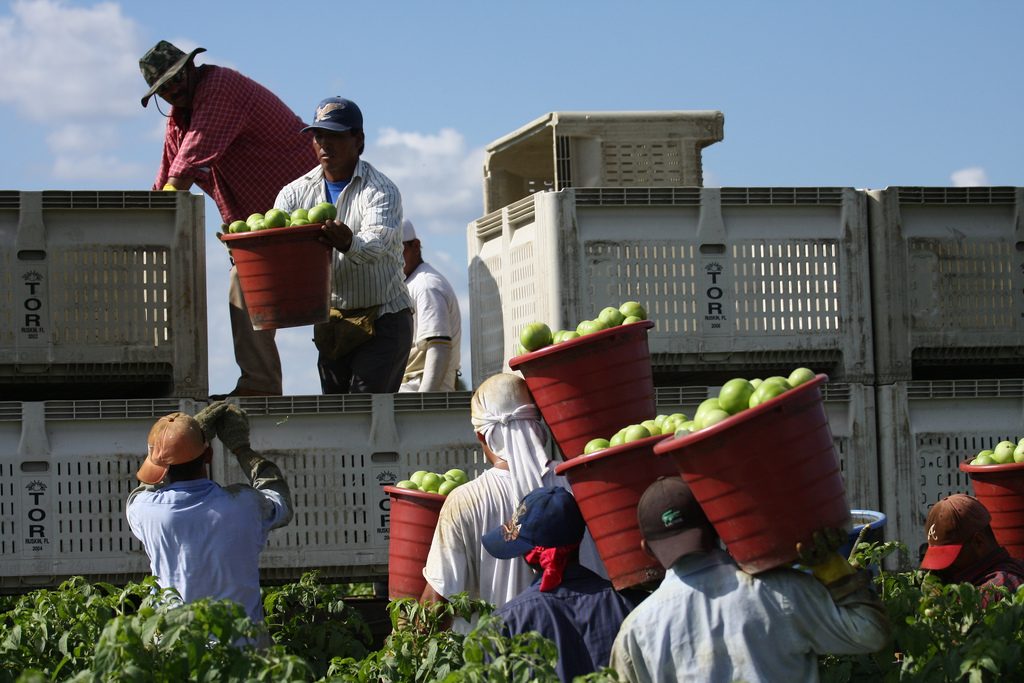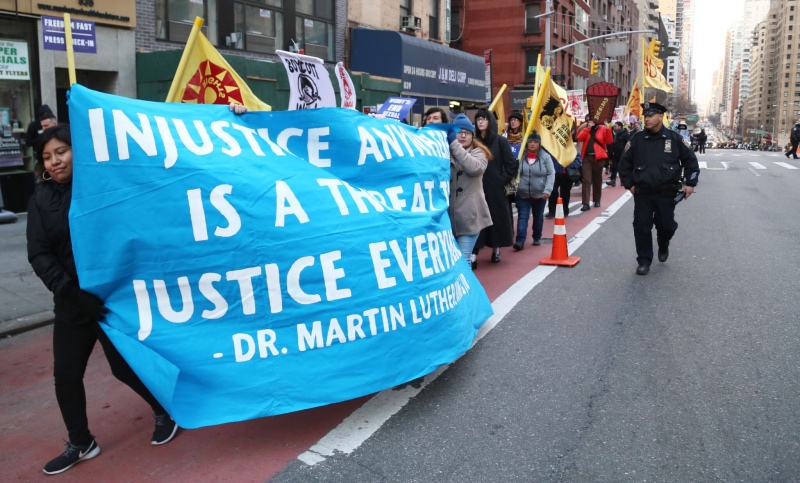
As thousands of farmworkers across the country test positive for COVID-19 — putting their lives, and our country’s food supply, in danger — how are retail food companies like Wendy’s stepping up to protect the health and safety of the essential workers their business depends on?
MARK YOUR CALENDARS: Join the Fair Food Nation on May 27 at 5 p.m. ET for a virtual “Essential Labor, Expendable Lives: A People’s Forum” condemning Wendy’s rejection of the Fair Food Program!
Over two months ago, the COVID-19 public health crisis began taking root in communities across the U.S. In the short time since then, the coronavirus has shaken our country to the core, leaving millions of people without jobs and claiming the lives of nearly 100,000 people — and counting. The devastation has been especially brutal in marginalized communities like Immokalee, where grinding poverty and overcrowded, substandard conditions existed long before the pandemic hit, thanks to generations of neglect by elected officials and industry leaders alike.
Here in Immokalee, farmworker leaders of the CIW have been working tirelessly to mobilize the community to protect itself against the coronavirus, while at the same time advocating with public health agencies for urgently-needed healthcare resources, all against a backdrop of continued indifference from state and local officials. Despite successfully securing an initial round of community-wide testing from the state, and establishing a promising partnership to address Immokalee’s COVID and non-COVID-related health care needs with two of the most highly-regarded health organizations in the world, Doctors Without Borders and Partners in Health, there remains much to be done. Workers are beginning to travel north up the East Coast with the summer harvest season, accompanied by the uncertainty of what will happen if they become sick while risking their lives to put food on our tables. And as the summer season begins, headlines are already beginning to surface with reports of hundreds of farmworkers testing positive for COVID-19, from Washington’s Yakima Valley to upstate New York.
Across the country, the COVID-19 crisis has exposed the many long-standing inequities within our food system. Despite the essential nature of their labor, workers from produce fields to meatpacking plants across the country are falling victim to the deadly virus due, in large part, to the overcrowded, sub-standard living and working conditions that have been their lot for generations. But the virus has not only pulled back the veil that, in normal times, obscures food workers’ lives from consumers’ view – it has also served to underscore an essential reality of our food system: The health of the multi-billion dollar brands at the top of the food industry is inextricably tied to the health of the millions of low-wage workers at the bottom.
When meatpackers in Sioux City, Iowa, are too sick to work because the unsafe, inhumane working conditions there — conditions they have been fighting to improve for decades — are the perfect medium for the spread of the coronavirus, the Smithfield plant is obliged to close its doors, grocery stores struggle to put meat on their shelves, and consumers across the country feel the pinch. Perhaps a chain is not the best metaphor to describe the food system, as the image implies a series of self-enclosed, independent links. Rather, the process that seamlessly stretches from fields and factories in Florida and California to grocery stores and restaurants across this country is more like a single body; when the arm is infected, the head feels the fever.
CIW’s Gerardo Reyes Chavez beautifully captured this analysis while speaking to NPR on Wednesday about the urgent need to ensure farmworkers are protected when risking their lives at work: “That’s one thing that many people don’t realize: Our well-being is tied together. If we don’t have food, then there is no way in which anything else can function.” Indeed, this inextricable connection underlies the very premise of the Fair Food Program: The solution to farmworker poverty and abuse lies in leveraging the immense wealth and market power of the brands at the top of the food industry to demand compliance with fundamental human rights in the fields at the bottom of their supply chains.
Wendy’s is no exception… and nor are greenhouses
The CIW has been calling on Wendy’s for nearly a decade to join the leading human rights program in the country for ensuring that farmworkers have access to safe, healthy and respectful working conditions. And for nearly a decade Wendy’s has refused. But if the pandemic has taught us anything, it’s that the well-being of farmworkers at the base of Wendy’s supply chain cannot be divorced from the company’s own well-being.
Just last week, news broke that nearly 200 farmworkers harvesting strawberries, tomatoes, and other produce in upstate New York for the greenhouse giant Green Empire Farms tested positive for COVID-19, becoming overnight the largest coronavirus outbreak in upstate New York. From an article titled, “Inside Green Empire Farm: Upstate NY’s biggest coronavirus outbreak slams migrant workers”:
At the end of each workday, 186 workers left the giant farm in vans and on buses, to return to hotels where they lived four to a room and slept two to a bed.
The workers’ living conditions, chosen for them by the labor company that hired them and brought them to Oneida, were perfect for the coronavirus to dig in and take hold.
And it did.
The indoor farming complex is now the site of the biggest coronavirus cluster in Upstate New York, according to Gov. Andrew Cuomo’s office. The only cluster outside of New York City that was bigger was in New Rochelle.
By Thursday, 169 of the 340 workers had tested positive.
“They were living in close quarters, together, so it was ripe for spread,” said Eric Faisst, Madison County public health director. “The conditions were perfect.”
The farmworkers living in the hotels are migrant workers who speak little English, county officials said.
Faisst said many of the workers are scared. They came here to the U.S. to work and send money to their families. Some are from Mexico and other Spanish-speaking countries, others are from Haiti. Now they are stuck: They can’t work, and they can’t go home.
Green Empire Farm is owned by Mastronardi Produce of Canada, which, according to an article from 2019, appears to be one of Wendy’s own greenhouse suppliers.
The outbreak in upstate New York illustrates the urgent need for companies like Wendy’s to use their purchasing power to demand compliance with worker health and safety standards from their produce suppliers, and to monitor that compliance just as vigorously as they do food safety standards. Sadly, the substandard living conditions found in the hotels housing Green Empire Farm’s workers — conditions that served as a superconductor to spread the virus among nearly the entire workforce there — remain commonplace on far too many farms that operate beyond the reach of the Fair Food Program. But conditions like those described in New York State were addressed long ago on participating farms in the Fair Food Program. And even during the pandemic, FFP growers have continued to comply with the day-to-day health and safety requirements of the Fair Food Code of Conduct, while also going above and beyond those requirements to implement and share best practices for the prevention of the spread of coronavirus. And the Fair Food Standards Council’s 24/7 complaint line has remained open, giving workers a voice on a wide range of concerns, from access to medical treatment to eligibility for economic relief.
Farmworkers who have worked on both FFP farms and outside the program describe the difference as “night and day.” In normal times, that difference is an outrage that demands remedy; during a pandemic, it could be the difference between life and death. Simply put, Wendy’s can no longer afford to turn its back on the most respected human rights program in the US agricultural industry, because the stakes today are just too high.
The coronavirus poses a dangerous threat to all essential workers, that is true. But it equally true that workers under the Fair Food Program are empowered — by the purchasing power of the leading food brands participating in the program — to be frontline monitors of their own rights, from the right to work free from sexual harassment to the right to indispensable health and safety standards. That fact puts Fair Food Program workers in an infinitely stronger position to advocate for better healthcare protections than farmworkers who toil without those critical protections.
Question: What do you call a hamburger company that can’t sell hamburgers?
If the story out of upstate New York wasn’t enough of a wake-up call, there was one more piece of news from this week that Wendy’s simply can’t ignore. From the New York Times, “A Wendy’s With No Burgers as Meat Production Is Hit”:
Hundreds of Wendy’s restaurants have run out of hamburgers. Kroger, the largest supermarket chain in the United States, is limiting the amount of ground beef and pork that customers can buy at some stores. And Costco, where shoppers typically buy in bulk, has placed a three-product cap on purchases of fresh beef, poultry and pork.
Over the last month, dozens of meatpacking plants across the country have shut down because of coronavirus outbreaks, raising concerns about the country’s meat supply. Now, the impact of those disruptions is reaching customers at fast-food drive-throughs as well as grocery stores like Wegmans and Hy-Vee, where certain meat products are becoming harder to find.
On Monday, nearly one-fifth of Wendy’s restaurants — a total of 1,043 locations — were completely sold out of beef products, including burgers, according to analysis by the financial firm Stephens, which examined the online menu at every Wendy’s in the United States.
On social media, customers posted photographs of “sold out” signs at Wendy’s drive-throughs and noted the irony of a hamburger shortage at a chain that popularized the slogan “where’s the beef?”
The chickens have come home to roost. It took a pandemic to bring them home, but sooner or later, one way or another, the years of neglect and abuse at the base of this country’s food system were going to make themselves felt in the fast-food restaurants and grocery stores at the top.
The very workers that Wendy’s decision-makers have turned their backs for years are the same workers responsible for the company’s financial health, when all is said and done. Instead of finding excuse after excuse not to join the most widely respected human rights program in agriculture today to protect those workers, isn’t it time for Wendy’s to partner with the CIW and invest in real, enforceable health, safety, and human rights standards in its supply chain? It’s not just the workers’ health on the line. It’s Wendy’s, too.
Join us at Wendy’s virtual shareholder meeting this May 27th!

On Wednesday, May 27, Wendy’s will be hosting its annual shareholder meeting online, and CIW farmworker leaders and their allies will once again be present to press Wendy’s key decision makers about the company’s refusal to join the Fair Food Program! Amid presentations on the company’s performance and most recent “sustainability” developments, certainly executives will also be addressing the unprecedented challenges created by the coronavirus pandemic. We will be there to ensure that the single most effective solution to those challenges is not forgotten.
That very same day, later in the evening at 5 p.m. ET, the Fair Food Nation will convene for a virtual “Essential Labor, Expendable Lives: A People’s Forum to Boycott Wendy’s,” where farmworker leaders will share a report from the morning meeting with Wendy’s top decision-makers, announce plans for continued action in the Campaign for Fair Food, and bring allies up to speed on CIW’s emergency relief efforts taking place in Immokalee. Mark your calendars to join us live via CIW’s Facebook page and YouTube channel!
